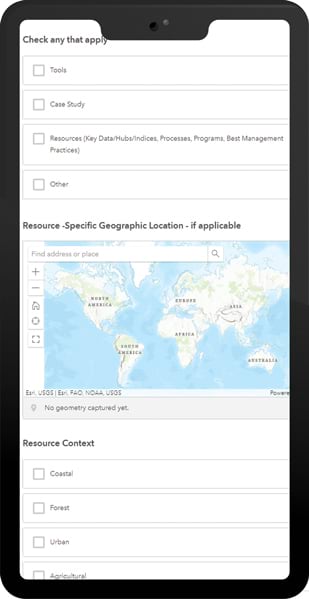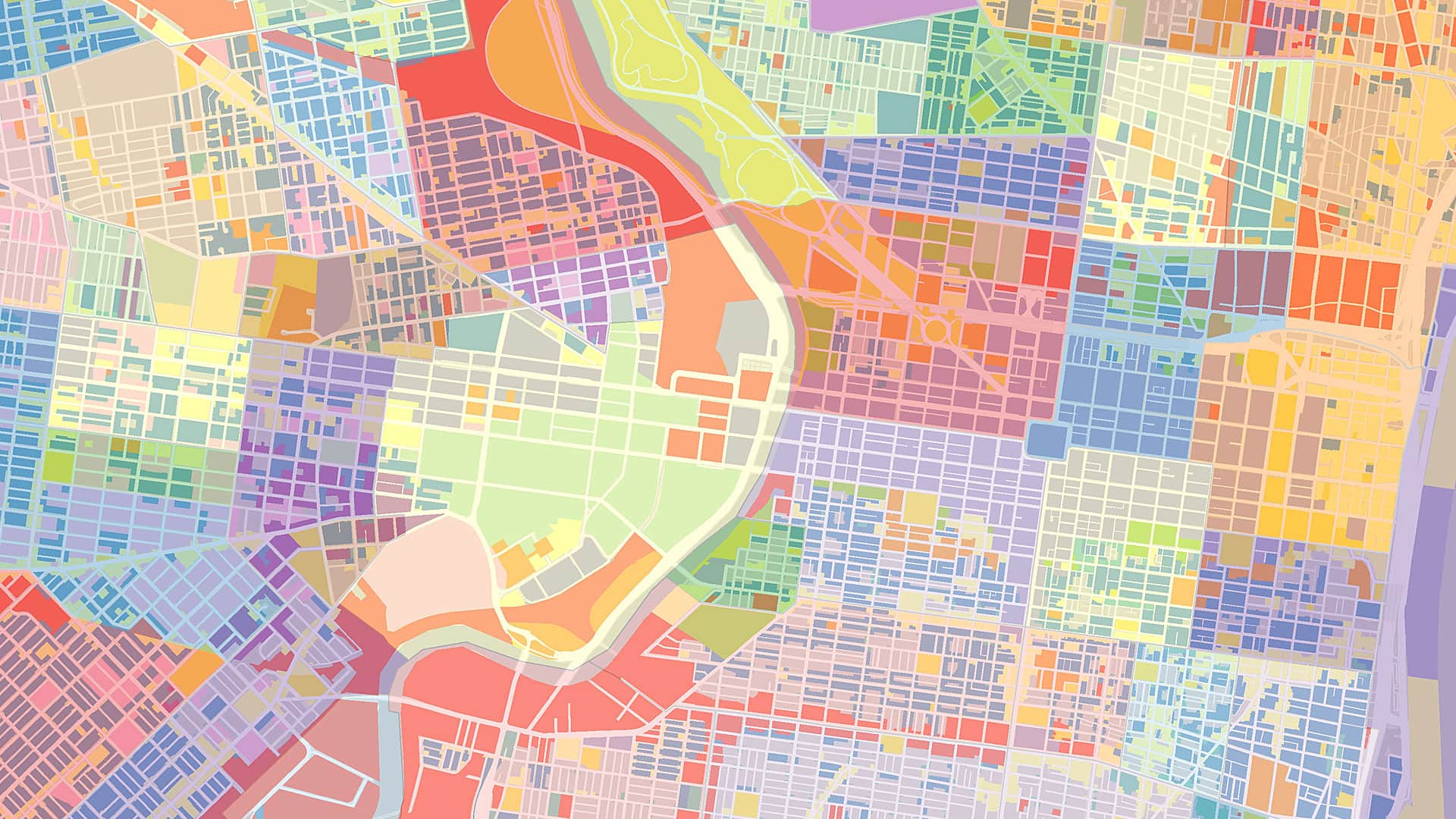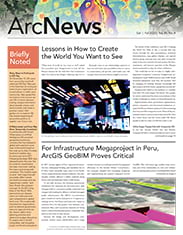This summer, communities around the globe experienced extreme heat, floods, and fires precipitated by human-caused climate change. It is difficult to deny that in what some people are calling the Age of the Anthropocene, human activity has begun to significantly affect the earth’s climate and ecosystems.
In opening the Plenary Session at the 2023 Esri User Conference, Esri president Jack Dangermond asked the audience to think about what kind of world they want to see. Dangermond believes that it is still possible to create a sustainable future—thanks, in part, to GIS professionals, who have a collective responsibility to imagine and create geospatial solutions. But GIS practitioners need to act now, he said.
At the Urban and Regional Information Systems Association (URISA), we couldn’t agree more. As the premier international organization that supports GIS professionals, URISA is energized to take action and support members of geospatial professions in addressing climate change and its impacts.
Recognizing the issues that the world faces and understanding the role that URISA can and should play in solving problems related to climate change, URISA formed a community resilience task force in 2019 to address several questions:
- What current impediments exist for collecting and disseminating data?
- What best practices could be implemented that address these issues?
- What mechanisms exist or can be developed to increase awareness and collaboration between resilience researchers and GIS practitioners?
- What partnerships can be developed to better enable community resilience?
By 2020, the task force had evolved into an active committee within URISA. Now it is known as the Climate and Community Resilience Committee (CCRC). URISA then created the Climate Change & Climate Equity Working Group (CCCEWG) to work within the committee to help empower communities that are experiencing the impacts of climate change with geospatial methods and data. This work supports advocacy and policy change with a focus on the social, cultural, and ecological aspects of climate justice and equity. The working group’s endeavors are based on the United Nations’ Sustainable Development Goal 13: taking urgent action to combat climate change and its impacts.
To further its mission, the CCCEWG has developed several products and other offerings for GIS practitioners to use to engage in climate change-related geospatial data gathering and sharing, collaboration, and education.
A Hub Site with a Resource Library
The CCCEWG’s main product is a site built with ArcGIS Hub that operates as a central location for geospatial tools, case studies, and other resources for people working on GIS-related climate change projects. The site developers’ goals are to highlight resources and tools that are currently available and make the site a living repository on the URISA website. Available at Climate Change and Climate Equity, the site sorts its resources by category, including carbon, equity, energy, heat, and floods.
Members of the CCCEWG are actively looking for resource submissions. Anyone who would like to share links to tools and case studies with this library should enter them into the ArcGIS Survey123 form on the CCCEWG website at Other Resources. The form also collects information from people who want to join the working group.

Climate Change-Focused Workshops
The working group has been active in developing climate change workshops for URISA’s annual GIS-Pro conference. For the 2021 gathering in Baltimore, Maryland, the CCCEWG delivered a half-day workshop called Net Positive! Giving Back to Baltimore through Climate Action Planning. The goal of the interactive workshop was to help attendees make meaningful contributions to the City of Baltimore’s Climate Action Plan by defining data gaps; investigating how climate affects Baltimore’s residents—especially as this relates to equity and climate justice, cultures, and geographic areas; and exploring possible climate mitigation and adaptation strategies.
At the 2022 GIS-Pro conference in Boise, Idaho, the CCCEWG presented a workshop titled Taking Climate Action and Achieving a Carbon Neutral Future. Breece Robertson, former impact officer for the nonprofit organization One Tree Planted, and Teresa Townsend, past president of URISA, discussed nature-based solutions for supporting climate action at local, regional, national, and global scales. Workshop participants learned that protecting or restoring ecosystems and creating parks and open spaces that advance health and climate resilience could provide one-third of the mitigation benefits needed to meet carbon reduction goals. GIS professionals have a tremendous opportunity to contribute by identifying where these solutions would have the biggest effects and tracking and verifying those impacts into the future.
Climate Change-Focused Workshops
The working group has been active in developing climate change workshops for URISA’s annual GIS-Pro conference. For the 2021 gathering in Baltimore, Maryland, the CCCEWG delivered a half-day workshop called Net Positive! Giving Back to Baltimore through Climate Action Planning. The goal of the interactive workshop was to help attendees make meaningful contributions to the City of Baltimore’s Climate Action Plan by defining data gaps; investigating how climate affects Baltimore’s residents—especially as this relates to equity and climate justice, cultures, and geographic areas; and exploring possible climate mitigation and adaptation strategies.
At the 2022 GIS-Pro conference in Boise, Idaho, the CCCEWG presented a workshop titled Taking Climate Action and Achieving a Carbon Neutral Future. Breece Robertson, former impact officer for the nonprofit organization One Tree Planted, and Teresa Townsend, past president of URISA, discussed nature-based solutions for supporting climate action at local, regional, national, and global scales. Workshop participants learned that protecting or restoring ecosystems and creating parks and open spaces that advance health and climate resilience could provide one-third of the mitigation benefits needed to meet carbon reduction goals. GIS professionals have a tremendous opportunity to contribute by identifying where these solutions would have the biggest effects and tracking and verifying those impacts into the future.
Organizational Adaptation Within URISA
CCCEWG volunteers are also working close to home by encouraging URISA and its members to take steps to benefit the planet.
Understanding that part of URISA’s mission is to promote conferences and that people must travel to these gatherings, which affects carbon emissions and the climate, the CCCEWG has gathered tips for how attendees can reduce their travel footprint. The working group messaged this advice through social media channels and on the URISA and CCCEWG websites ahead of the 2023 Esri User Conference, and the group will continue to promote greener travel to all URISA events.
To celebrate URISA’s 60th anniversary in 2022, the organization planted 1,014 trees during the GIS-Pro conference in Boise. The trees were donated by attendees and others in partnership with One Tree Planted. Members of the CCCEWG continue to look for opportunities for participants in future conferences to help offset their travel during the registration process.
In addition, the CCCEWG is currently preparing a call to action to be adopted by URISA’s board of directors to formalize having the group join and support organizations that are endeavoring to create a sustainable and resilient future. For example, the CCCEWG seeks to support the United Nations Global Compact, which provides a framework for businesses around the world to conduct their work sustainably.
Seeking Volunteers
URISA, the CCRC, and the CCCEWG are always looking for more volunteers to help with climate action committees and working groups. Anyone who would like to join these efforts should enter their contact information.


